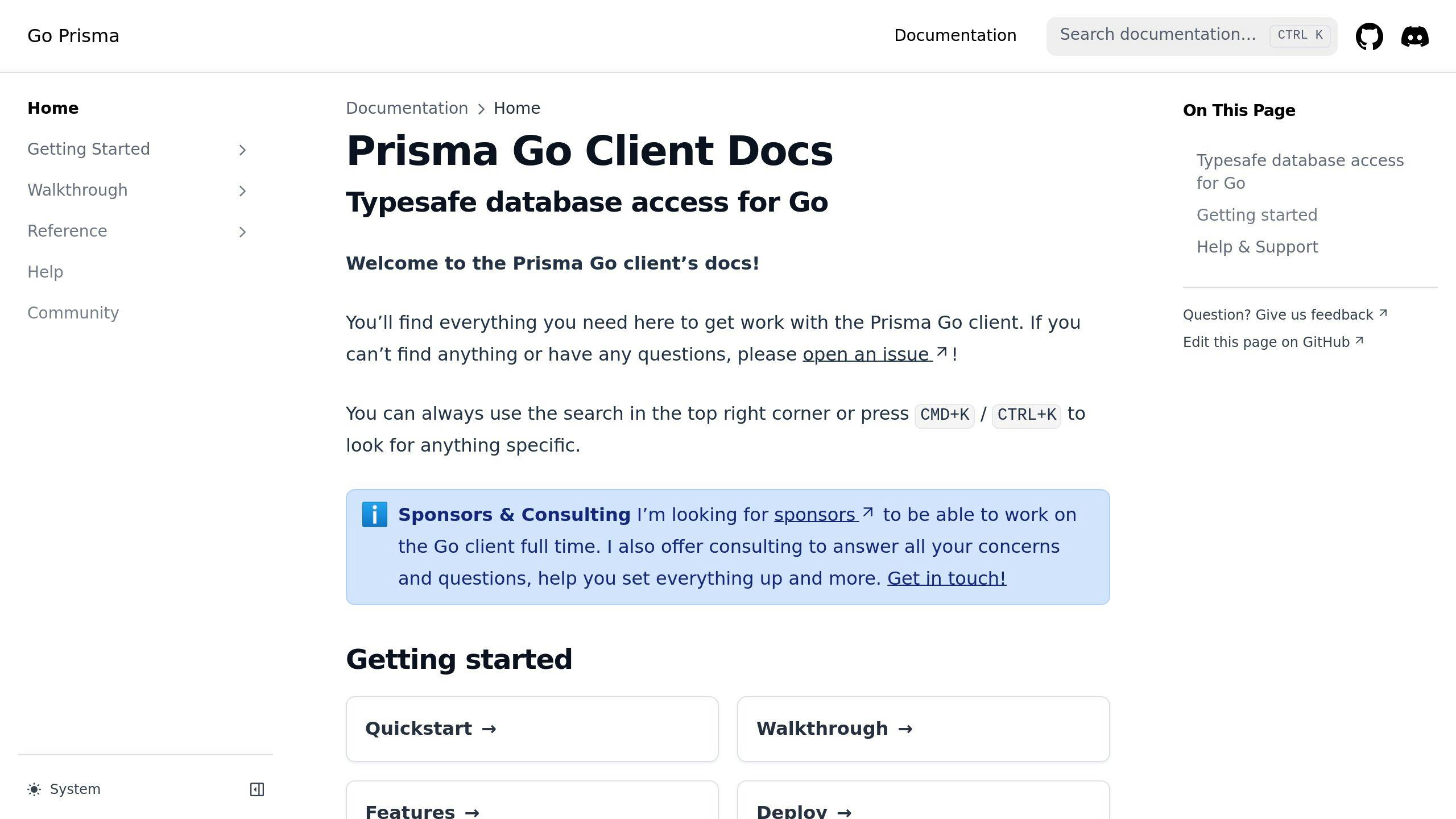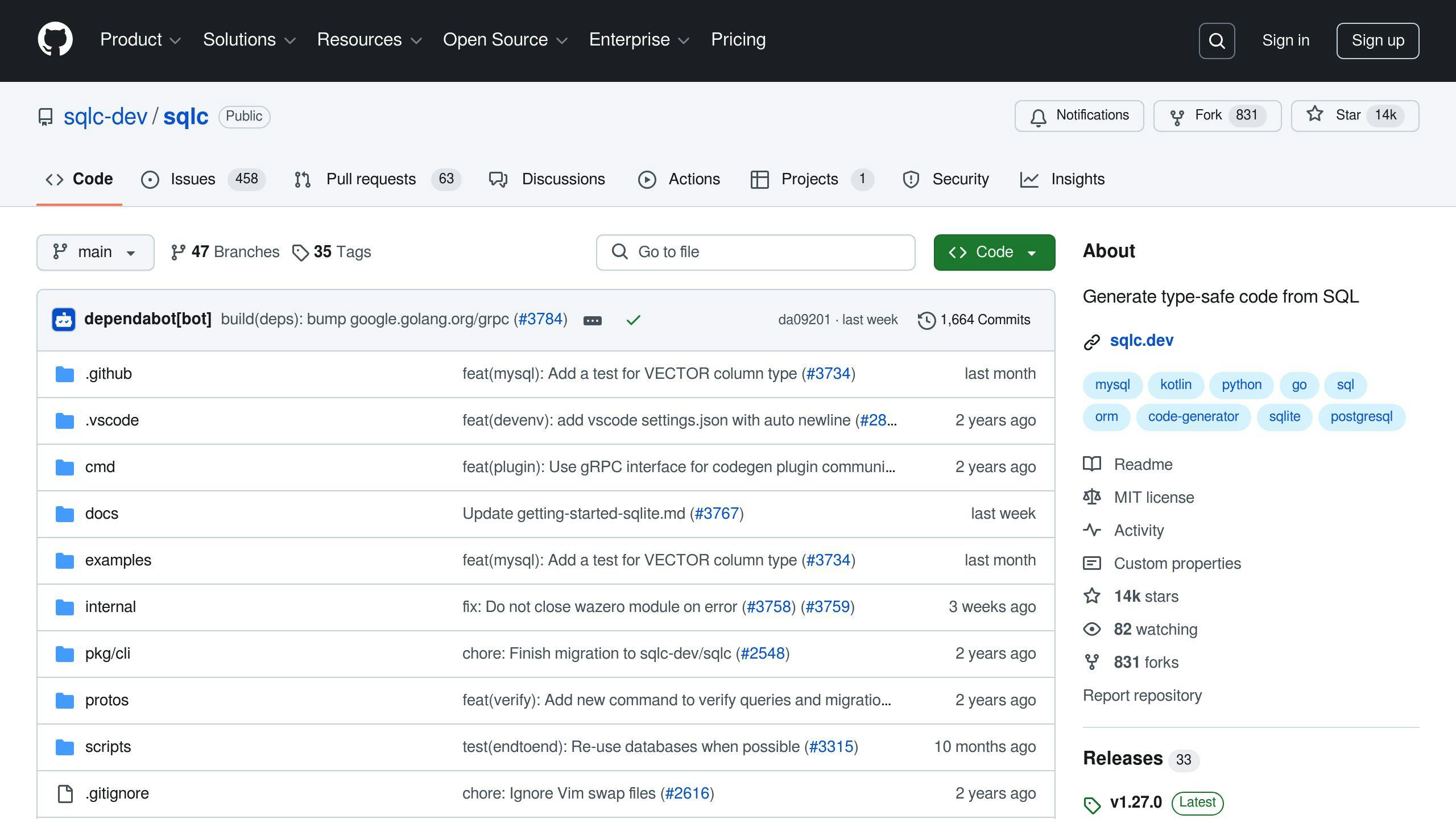
5 Best Practices for Type-Safe Database Queries in Go
Type-safe database queries in Go reduce runtime errors, improve maintainability, and make coding faster. Tools like Prisma Client Go and sqlc help achieve this by generating type-safe code based on your database schema. Here’s a quick rundown of the best practices covered in this article:
- Use Auto-Generated Query Builders: Tools like
Prisma Client Gogenerate type-safe methods directly from schemas. - Write Type-Safe Raw SQL: Use
sqlcto maintain type safety while writing raw SQL queries. - Follow SQL Best Practices: Use table aliases, optimize
WHEREclauses, and plan your indexing strategy. - Leverage Code Generation Tools: Automate code creation to reduce manual errors and ensure consistency.
- Combine Tools: Pair
Prisma Client Gofor complex relationships withsqlcfor optimized raw SQL.
Quick Comparison
| Tool | Best For | Key Features |
|---|---|---|
| Prisma Client Go | Schema-driven queries, relationships | Auto-completion, type-safe query builder |
| sqlc | Raw SQL with type safety | Compile-time checks, custom SQL control |
These practices and tools help you write safer, more efficient database code in Go. Let’s dive into the details!
Prisma Client Go at Prisma Day 2021

1. Use Tools with Auto-Generated Query Builders
Auto-generated query builders help reduce errors by generating statically typed code directly from your database schema. This approach ensures type safety and makes your database interactions more reliable.
Prisma Client Go is a great example of this. It offers features like compile-time error detection, schema-driven code generation, and support for advanced tasks like transactions and JSON handling. These tools simplify database programming in Go and help maintain a more stable codebase.
Here’s a quick comparison of different approaches to database interactions:
| Approach | Type Safety | Developer Efficiency | Error Detection |
|---|---|---|---|
| Manual SQL Queries | Limited | Low | Runtime |
| Auto-Generated Builders | Strong | High | Compile-time |
| Raw SQL with Type Checking | Moderate | Medium | Mixed |
To get started, follow these steps:
- Define your database schema.
- Use the CLI to generate type-safe code.
- Integrate the generated code into your application’s data layer.
When paired with other tools in the Go ecosystem, Prisma Client Go becomes even more effective. It ensures consistent, reliable database interactions while reducing runtime errors. This not only strengthens your database operations but also makes your code easier to maintain.
For added flexibility, you can combine auto-generated query builders with type-safe raw SQL queries. This allows for greater precision in specific scenarios while keeping the benefits of type safety intact.
2. Write Type-Safe Raw SQL Queries
Using tools like sqlc allows you to write raw SQL queries while keeping them type-safe and error-free at compile time. sqlc takes your SQL queries and generates Go code that's type-safe, ensuring errors are caught before your application runs. This method gives you the flexibility of raw SQL without sacrificing the safety and reliability Go developers value.
Organize your queries in separate .sql files for better structure and easier management. Here's an example:
-- name: GetUserByID :one
SELECT id, name, email, created_at
FROM users
WHERE id = $1;
When you run sqlc, it generates Go code with function signatures and matching structs, making it easy to integrate these queries into your application.
| Feature | sqlc | Traditional Raw SQL |
|---|---|---|
| Type Safety | Checked at compile-time | Checked at runtime |
| Query Validation | During code generation | During execution |
| Maintenance | Auto-generated code | Manual updates |
For more complex queries, sqlc supports features like transactions, Common Table Expressions (CTEs), and connection pooling through pgx. To keep your queries efficient and readable, follow these tips:
- Use table aliases for clarity.
- Avoid using functions on columns in
WHEREclauses. - Stick to
=for exact matches. - Index columns that are frequently queried.
While sqlc handles type safety, combining it with good SQL practices ensures your database operations are both reliable and efficient.
3. Follow Best Practices for SQL Query Writing
Creating type-safe SQL queries requires a thoughtful approach that balances clarity and performance. These practices work well alongside tools like Prisma Client Go and sqlc, ensuring safer and more efficient database interactions in Go.
Use Table Aliases and Optimize WHERE Clauses
When working with multiple tables, clear and meaningful aliases make your queries easier to read and help reduce mistakes. Pay attention to how you write your WHERE clauses to keep queries consistent and efficient. Here's an example:
SELECT u.id, u.name
FROM users AS u
WHERE u.status = 'active';
To maintain type safety and improve performance:
- Stick to exact matches with the
=operator. - Avoid applying functions directly to columns in
WHEREclauses. - Refrain from using leading wildcards in conditions, as they can affect consistency.
- Use indexed columns for conditions you frequently query.
Leverage Common Table Expressions (CTEs)
CTEs are a great way to organize complex queries. They make type conversions and data transformations more straightforward, improving both readability and type safety. For instance:
WITH user_events AS (
SELECT id,
CAST(data->>'user_id' AS INTEGER) AS user_id
FROM events
)
SELECT *
FROM user_events;
Plan Your Index Strategy
Indexing is crucial for keeping queries type-safe and fast. Focus on indexing columns that are commonly used in WHERE clauses and JOIN conditions. This is especially important for columns involved in type-sensitive comparisons and joins, as it ensures smoother and more reliable query performance.
sbb-itb-a3c3543
4. Use Code Generation Tools for Type Safety
Writing clean SQL is important, but using code generation tools can take your type safety to the next level. These tools generate Go code directly from your SQL queries or database schemas, helping you avoid runtime errors and cutting down on manual coding mistakes.
Try sqlc for Type-Safe SQL Queries
sqlc is a tool that creates type-safe Go code from your SQL queries. Here's an example of how it works:
-- queries.sql
SELECT id, name, status
FROM users
WHERE status = $1;
// Generated Go code
func GetUsersByStatus(ctx context.Context, status string) ([]User, error) {
// Auto-generated type-safe implementation
}
With sqlc, you can write raw SQL while still benefiting from Go's type safety.
Use Prisma Client Go for Schema-Driven Queries
Prisma Client Go provides a type-safe query builder based on your database schema. It simplifies complex queries with features like auto-completion, schema validation, and safe handling of relationships. This makes it a great choice for more intricate database operations.
Best Practices for Code Generation
To make the most of code generation tools, keep these tips in mind:
- Always regenerate code after making schema changes.
- Track generated files separately in your version control system.
- Use code generation consistently for database interactions to maintain uniformity.
Combine Tools for Maximum Type Safety
You don’t have to pick just one tool. For example, you can use sqlc for raw SQL and Prisma Client Go for higher-level queries. Here's how a Prisma query might look:
users, err := client.User.FindMany(
db.User.Status.Equals("active"),
db.User.Age.GT(18),
).With(
db.User.Posts.Fetch(),
).Exec(ctx)
These tools are widely embraced by the Go community because they improve reliability and make your code easier to maintain. By integrating them into your workflow, you can reduce repetitive code and maintain strong type safety across your database operations.
5. Combine Prisma Client Go and sqlc for Better Type Safety

Using Prisma Client Go alongside sqlc creates a solid approach for type-safe database operations in Go applications.
How These Tools Work Together
Prisma Client Go's auto-generated query builder simplifies handling complex relationships, while sqlc brings precise control with raw SQL and compile-time safety. Here’s how you can combine them effectively:
Prisma Client Go makes working with nested relationships straightforward:
// Using Prisma Client Go for high-level queries
orders, err := client.Order.FindMany(
db.Order.Status.Equals("pending"),
).With(
db.Order.Customer.Fetch().With(
db.Customer.Address.Fetch(),
),
).Exec(ctx)
sqlc, on the other hand, ensures type-safe custom SQL queries:
-- Define your SQL query
SELECT o.id, o.status, c.name
FROM orders o
JOIN customers c ON o.customer_id = c.id
WHERE o.status = $1;
// sqlc generates type-safe functions
func GetOrdersWithCustomers(ctx context.Context, status string) ([]OrderWithCustomer, error) {
// Type-safe implementation generated automatically
}
Choosing the Right Tool for the Job
| Scenario | Best Fit | Why It Works |
|---|---|---|
| Complex Relationships & Flexible Queries | Prisma Client Go | Simplifies query building with type-safe relationship handling |
| Performance-Intensive Queries | sqlc | Offers raw SQL control and optimized performance |
Tips for Implementation
To get the most out of both tools, keep these points in mind:
- Use Prisma Client Go for tasks that involve managing complex relationships or require dynamic queries.
- Rely on sqlc for performance-critical queries where you need more control over the SQL.
- Standardize your error handling across both tools to ensure consistency in your application.
This combination not only improves type safety but also aligns with Go's focus on creating reliable and maintainable code.
Avoiding Errors
Prisma Client Go helps catch issues during development, while sqlc enforces compile-time checks for raw SQL. Although Prisma Client Go is still in alpha, its ability to auto-generate query builders makes it a strong option for handling intricate database operations.
Wrapping It Up
This article has highlighted how using type-safe database queries can elevate Go applications by leveraging modern tools and best practices. Prioritizing type safety in database queries boosts reliability, makes maintenance easier, and helps applications scale more effectively - key elements for building solid software.
Tools like Prisma Client Go and sqlc offer powerful solutions for type-safe database operations. Prisma excels at managing complex relationships, while sqlc provides precise control over raw SQL with compile-time safety checks. Together, they streamline workflows with features like auto-generated query builders and code generation tools, all while following SQL best practices.
These modern tools have reshaped how developers handle database interactions in Go. Features such as declarative data modeling and seamless database updates ensure strict type safety throughout the process. To maximize results, teams should rely on auto-generated builders, stick to SQL standards, and fully utilize code generation tools.
Although it's still in alpha, Prisma Client Go has already simplified complex queries, pushing type-safe database programming forward. By adopting these tools and approaches, developers can build applications that are not only ready for the future but also meet the increasing demand for type safety in today's software world.
FAQs
Does Prisma allow raw SQL?
Prisma Client Go does support raw SQL queries, but it’s better to use TypedSQL whenever possible. TypedSQL offers type safety and compile-time validation, making your database interactions more reliable. While raw SQL can handle complex or legacy systems, it lacks the built-in safety features of TypedSQL.
| Query Type | Best For | Advantage |
|---|---|---|
| TypedSQL | Most queries | Compile-time validation and safety |
| Raw SQL | Complex/Legacy cases | Direct database access |
Here’s how to approach it:
- Stick with TypedSQL for most of your database queries to ensure safety and predictability.
- Use raw SQL sparingly, only when you need direct access for complex or legacy requirements.
- Take advantage of Prisma's type-checking features for both query methods.
If you need even more flexibility, pairing Prisma Client Go with tools like sqlc can give you added type safety while still letting you work with raw SQL. This combination ensures safer database operations, even in tricky scenarios.